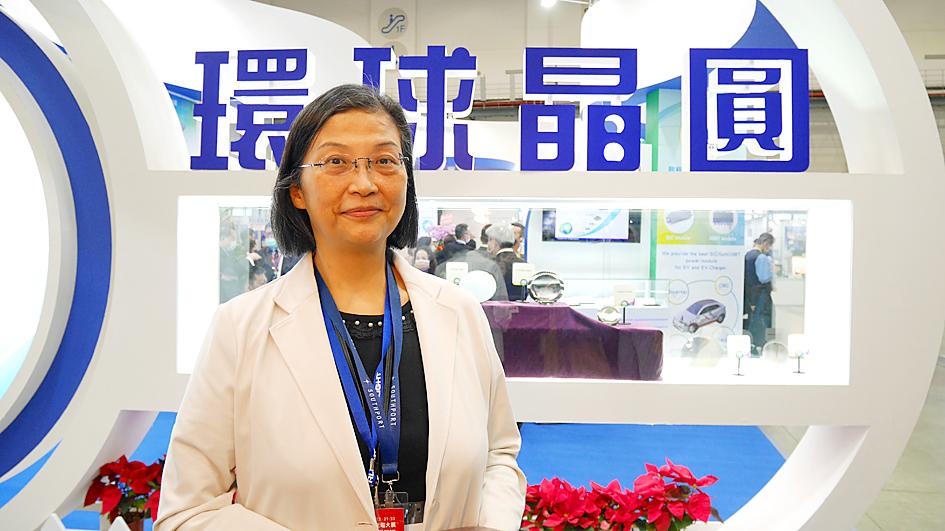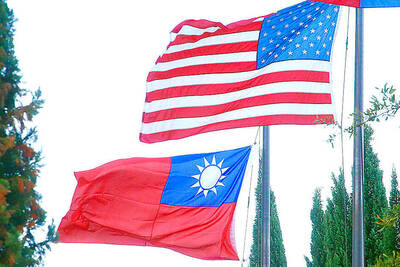GlobalWafers Co (環球晶圓) yesterday expressed frustration that its planned takeover of Siltronic AG failed to win regulatory approval from the German government, saying it would reassess its future investment strategy.
The US$5 billion deal was derailed by the German government, which did not reach a decision on its review of the transaction after more than a year. The German Ministry for Economic Affairs and Energy blamed a late approval from China for not making a decision in time.
“Until the end of this deadline, not all necessary steps of the investment review could be concluded,” the ministry said in an e-mailed statement. “This applies especially to the review of the approval by the Chinese authorities, which only happened last week.”

Photo: Fang Wei-jie, Taipei Times
The failed transaction raises questions over what comes next for the Taiwanese technology company as well as Siltronic. Shares of the German company, which could again become a target, rose as much as 3.9 percent, valuing it at 3.6 billion euros (US$4.1 billion).
Wacker Chemie AG, Siltronic’s largest shareholder, said it still planned to sell its 30.8 percent stake in the medium term.
The ministry said it would renew its review in the event of another offer.
Initially announced in December 2020, the takeover of Munich-based Siltronic was intended to boost GlobalWafers’ capabilities in 5G and Internet of Things technologies, as well as accelerate its progress toward compound-based semiconductors, the next stage in development beyond silicon.
Both firms acknowledged the deal’s failure with the passing of the agreement’s deadline on Monday.
In GlobalWafers’ statement, the company said it had made “extremely far-reaching remedy proposals and commitments,” and Germany’s approval was the last outstanding condition.
“Based on our efforts to reach a mutually acceptable solution as well as our long and successful history in Europe this outcome is very disappointing,” GlobalWafers chairwoman Doris Hsu (徐秀蘭) said in the statement. “We will analyze the non-decision of the German government and consider its impact on our future investment strategy.”
The business combination agreement includes a clause for GlobalWafers to pay a termination fee of 50 million euros to Siltronic in the event of failure to obtain regulatory approvals within the applicable deadlines, Siltronic said in a statement yesterday.
GlobalWafers struggled to win over Germany at a time when governments around the world are on alert over the risk of losing key technology. At a closed-door meeting on Friday, Hsu failed to resolve the government’s concerns.
The meeting marked the firm’s final opportunity to convince authorities to back the deal. The company had offered the government special voting rights via a “golden share,” as well as ways to undo the purchase or sell back key assets in Siltronic, Bloomberg News reported.
International chip takeovers have faced increasing headwinds as governments have begun to treat semiconductors and supply chains as national security issues.
Nvidia Corp is preparing to abandon its purchase of British chip company Arm Ltd from Softbank Group Corp after drawing backlash from regulators and making little to no progress in winning approval for the US$40 billion deal, while Chinese regulators signed off on Advanced Micro Devices Inc’s purchase of Xilinx Inc, clearing the way for one of the largest deals in the global semiconductor industry.
In its statement, GlobalWafers said it directly holds 13.67 percent of Siltronic shares and has no specific restrictions on future trading.
The company said it would announce alternative plans on Sunday.

Taiwan’s Lee Chia-hao (李佳豪) on Sunday won a silver medal at the All England Open Badminton Championships in Birmingham, England, a career best. Lee, 25, took silver in the final of the men’s singles against world No. 1 Shi Yuqi (石宇奇) of China, who won 21-17, 21-19 in a tough match that lasted 51 minutes. After the match, the Taiwanese player, who ranks No. 22 in the world, said it felt unreal to be challenging an opponent of Shi’s caliber. “I had to be in peak form, and constantly switch my rhythm and tactics in order to score points effectively,” he said. Lee got

EMBRACING TAIWAN: US lawmakers have introduced an act aiming to replace the use of ‘Chinese Taipei’ with ‘Taiwan’ across all Washington’s federal agencies A group of US House of Representatives lawmakers has introduced legislation to replace the term “Chinese Taipei” with “Taiwan” across all federal agencies. US Representative Byron Donalds announced the introduction of the “America supports Taiwan act,” which would mandate federal agencies adopt “Taiwan” in place of “Chinese Taipei,” a news release on his page on the US House of Representatives’ Web site said. US representatives Mike Collins, Barry Moore and Tom Tiffany are cosponsors of the legislation, US political newspaper The Hill reported yesterday. “The legislation is a push to normalize the position of Taiwan as an autonomous country, although the official US

CHANGE OF TONE: G7 foreign ministers dropped past reassurances that there is no change in the position of the G7 members on Taiwan, including ‘one China’ policies G7 foreign ministers on Friday took a tough stance on China, stepping up their language on Taiwan and omitting some conciliatory references from past statements, including to “one China” policies. A statement by ministers meeting in Canada mirrored last month’s Japan-US statement in condemning “coercion” toward Taiwan. Compared with a G7 foreign ministers’ statement in November last year, the statement added members’ concerns over China’s nuclear buildup, although it omitted references to their concerns about Beijing’s human rights abuses in Xinjiang, Tibet and Hong Kong. Also missing were references stressing the desire for “constructive and stable relations with China” and

Foreign ministers of leading Western democracies sought to show a united front in Canada yesterday after seven weeks of rising tensions between US allies and US President Donald Trump over his upending of foreign policy on Ukraine and imposing of tariffs. The G7 ministers from the UK, Canada, France, Germany, Italy, Japan and the US, along with the EU, convened in the remote tourist town of La Malbaie, nestled in the Quebec hills, for two days of meetings that in the past have broadly been consensual on the issues they face. Top of the agenda for Washington’s partners would be getting a